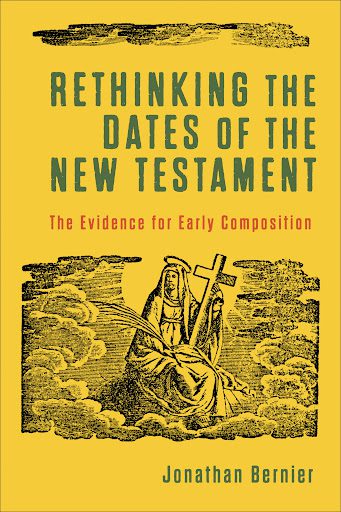- Jan 2, 2014
- 12,212
- 3,864
- 113
- Faith
- Christian
- Country
- United States
When Was The Book Of Revelation Written?
Author: Wayne Jackson, Christian CourierTraditionally, the book of Revelation has been dated near the end of the first century, around A.D. 96. Some writers, however, have advanced the preterist (from a Latin word meaning “that which is past”) view, contending that the Apocalypse was penned around A.D. 68 or 69, and thus the thrust of the book is supposed to relate to the impending destruction of Jerusalem (A.D. 70).
A few prominent names have been associated with this position (e.g., Stuart, Schaff, Lightfoot, Foy E. Wallace Jr.), and for a brief time it was popular with certain scholars. James Orr has observed, however, that recent criticism has reverted to the traditional date of near A.D. 96 (1939, 2584). In fact, the evidence for the later date is extremely strong.
In view of some of the bizarre theories that have surfaced in recent times (e.g., the notion that all end-time prophecies were fulfilled with the fall of Jerusalem in A.D. 70), which are dependent upon the preterist interpretation, we offer the following.
External Evidence
The external evidence for the late dating of Revelation is of the highest quality.Irenaeus
Irenaeus (A.D. 180), a student of Polycarp (who was a disciple of the apostle John), wrote that the apocalyptic vision “was seen not very long ago, almost in our own generation, at the close of the reign of Domitian” (Against Heresies 30). The testimony of Irenaeus, not far removed from the apostolic age, is first rate. He places the book near the end of Domitian’s reign, and that ruler died in A.D. 96. Irenaeus seems to be unaware of any other view for the date of the book of Revelation.Clement of Alexandria
Clement of Alexandria (A.D. 155-215) says that John returned from the isle of Patmos “after the tyrant was dead” (Who Is the Rich Man? 42), and Eusebius, known as the “Father of Church History,” identifies the “tyrant” as Domitian (Ecclesiastical History III.23).Even Moses Stuart, America’s most prominent preterist, admitted that the “tyrant here meant is probably Domitian.” Within this narrative, Clement further speaks of John as an “old man.” If Revelation was written prior to A.D. 70, it would scarcely seem appropriate to refer to John as an old man, since he would only have been in his early sixties at this time.
Victorinus
Victorinus (late third century), author of the earliest commentary on the book of Revelation, wrote:When John said these things, he was in the island of Patmos, condemned to the mines by Caesar Domitian. There he saw the Apocalypse; and when at length grown old, he thought that he should receive his release by suffering; but Domitian being killed, he was liberated (Commentary on Revelation 10:11).
Jerome
Jerome (A.D. 340-420) said,To all of this may be added the comment of Eusebius, who contends that the historical tradition of his time (A.D. 324) placed the writing of the Apocalypse at the close of Domitian’s reign (III.18). McClintock and Strong, in contending for the later date, declare that “there is no mention in any writer of the first three centuries of any other time or place” (1969, 1064). Upon the basis of external evidence, therefore, there is little contest between the earlier and later dates.In the fourteenth then after Nero, Domitian having raised up a second persecution, he [John] was banished to the island of Patmos, and wrote the Apocalypse (Lives of Illustrious Men 9).
Internal Evidence
The contents of the book of Revelation also suggest a late date, as the following observations indicate.The spiritual conditions of the churches described in Revelation chapters two and three more readily harmonize with the late date.
The church in Ephesus, for instance, was not founded by Paul until the latter part of Claudius’s reign: and when he wrote to them from Rome, A.D. 61, instead of reproving them for any want of love, he commends their love and faith (Eph. 1:15) (Horne 1841, 382).
Yet, when Revelation was written, in spite of the fact that the Ephesians had been patient (2:2), they had also left their first love (v. 4), and this would seem to require a greater length of time than seven or eight years, as suggested by the early date.
Another internal evidence of a late date is that this book was penned while John was banished to Patmos (1:9). It is well known that Domitian had a fondness for this type of persecution. If, however, this persecution is dated in the time of Nero, how does one account for the fact that Peter and Paul are murdered, yet John is only exiled to an island? (Eusebius III.18; II.25).
Then consider this fact. The church at Laodicea is represented as existing under conditions of great wealth. She was rich and had need of nothing (3:17). In A.D. 60, though, Laodicea had been almost entirely destroyed by an earthquake. Surely it would have required more than eight or nine years for that city to have risen again to the state of affluence described in Revelation.
The doctrinal departures described in Revelation would appear to better fit the later dating. For example, the Nicolaitans (2:6, 15) were a full-fledged sect at the time of John’s writing, whereas they had only been hinted at in general terms in 2 Peter and Jude, which were written possibly around A.D. 65-66.
Persecution for professing the Christian faith is evidenced in those early letters to the seven churches of Asia Minor. For instance, Antipas had been killed in Pergamum (2:13). It is generally agreed among scholars, however, that Nero’s persecution was mostly confined to Rome; further, it was not for religious reasons (Harrison 1964, 446).


